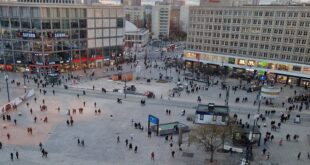The Argentine football legend, Diego Armando Maradona, died aged 60 on Wednesday, after a life that showcased the good, the bad and the ugly of the human condition. But he will mostly be remembered for his footballing exploits which transcended the sport. Our Contributing Editor, Michael Nnaji, looks back on his life.
My first recollections of Diego Maradona were during the 1990 World Cup in Italy. Although he was generally believed to have been slightly past his prime by then, there was no doubting his footballing genius, as he literally dragged a rather average Argentina side to the final where they lost to the then West Germany. it was a time that every kid wanted to play like Diego Maradona.
Before then, at the peak of his game at the previous World Cup in Mexico four years earlier, he had dominated the Mundial like no other player before him – or since. El Diego, as he is fondly referred to by his fans, lit up the tournament, culminating in his performance against England in the quarterfinals. The game had taken place against the backdrop of the Falklands war involving both nations, in which Argentina came off worse.
Maradona then scored what is regarded as one of the most fantastic goals in World Cup history, picking up the ball in the centre circle and wheeling away from his marker before beating four other England players including the goalkeeper, Peter Shilton, before slotting home.
A few minutes before that sumptuous goal, he had beaten Shilton, to a high ball using his hand while feigning to have headed the ball goalwards. The referee and his linesman failed to spot the sleight of hand, setting the stage for England’s defeat.
Maradona would cheekily refer to it as “Hand of God” afterwards. The English, unsurprisingly, were not amused. Although, his legend is generally reduced to those moments, Maradona’s achievements go far beyond them. By going on to win the World Cup, Maradona become a living legend in his native Argentina.
From humble beginnings to troubled global fame
Born into a poor family in the suburbs of Buenos Aires, Maradona fell in love with the beautiful game after his uncle bought him a football on his fifth birthday. His father was an immigrant from Southern Italy while his mother was an indigenous Argentinian of Indian origin.
The young Maradona grew up under very modest conditions, living in a shanty with his family where they scrounged for a living. The story has been recounted of the young Diego being rescued from a cesspit at age 3 by his uncle, who admonished him to stop falling into pits.
This anecdote can be seen as the quintessence of the footballer’s life story, as he stood up each time fate dealt a blow to him, on and off the pitch – either by defenders frustrated by his otherworldly talents or his reckless lifestyle, which included his addiction to cocaine and alcohol as well as extramarital affairs and run-ins with tax authorities.

Ultimately, Maradona could not cheat death after so many brushes with it, following various health issues that, aside from substance abuse, included weight issues and mental health conditions.
Days before his death, he had undergone neurosurgery to treat a brain clot. He had reportedly recovered well from the procedure but suffered a cardiac arrest at home. That nine ambulances arrived at his residence in an effort to resuscitate him shows the high regard in which he is held in his homeland despite his various misdemeanours.
For younger football fans, the abiding memory of Maradona will be the wreck of a frail man with an over bloated figure that has been subjected to self-abuse. But for the older ones, Diego Maradona’s footballing talents will always outweigh his perceived off-pitch shortcomings.
True fans of football will certainly remember him for elevating the sport to new hights. Like a magician, he created things out of nothing and allied supreme footballing qualities with courage and a never-say-die attitude.
Maradona not only represented Argentina with distinction but also played some of his best football at club level, notably with Napoli in Italy, whom he had joined from Barcelona for a world record fee in the early 80s.
Italy’s Serie A was widely regarded as the best and toughest league in the world back then. He subsequently led the provincial Southern Italian outfit to two unprecedented Italian titles and the UEFA cup, cementing his legend in Neapolitan hearts. These achievements become even more remarkable when taken into account that it was achieved despite competing against the Northern Italian super clubs, AC Milan, Internazionale and Juventus.
Sadly, Maradona increasingly become addicted to cocaine and was reportedly associated with the local mafia during this period. There were reports of indiscipline on his spart, skipping training sessions, partying and womanising.
Why Maradona stood apart from other greats
Maradona never did things in half-measures. But like they say, you cannot keep a good man down. When the chips were done El Diego always delivered. He was essentially married to the ball, which seemed to do his every bidding. He could glide past opponents as if they weren’t there and had an eye for goal that was ethereal while having the peripheral vison of an owl (his needle-of-the-eye pass while surrounded by a swirl of yellow shirts to Claudio Paul Caniggia to score the winner of the second round game against Brazil at the 1990 World Cup springs to mind and can still be marvelled at on YouTube).
READ ALSO Drogba on why he’s proud of winning UEFA President’s Award
Comparisons are sometimes made with other greats of the game, most notably his countryman Lionel Messi, the Brazilian Pele, Portugal’s Cristiano Ronaldo and France’s Zidane Zidane, but for me, Maradona stood apart. The other aforementioned players were rather “fortunate” to have played alongside teammates of supreme qualities, in contrast to Maradona who stood head and shoulders above his teammates. For one, he was a dominator. If he played well, his team did.
One of the reasons advanced for his troubled life off the pitch was the pressure associated with being an idol to which people looked up to. He was mobbed not only by fans but by fellow professionals, who recognized greatness among them (Terry Fenwick, one of the England players he dribbled past to score that aforementioned goal against England, requested for and got his shirt after that quarterfinal game, albeit to the chagrin of some of his teammates).
His prodigious talents had become apparent at an early stage. Due to the fact that he was rather small for his age group, he was given supplements to encourage growth spurts. Were these the origins of his proclivity for substance abuse in his later life? Or were the flights into cocaine and alcohol a form of escapism from the brutality he faced from defenders on the pitch which led to various career-threatening injuries? Or was it his way of dealing with the pressure and limelight of being Diego Maradona?
We will never know for sure. What is probably not debatable is that his travails which often played out like a soap opera in the public has served as a form of cautionary tale to the football stars after him, with the private lives of footballers jealously guarded and carefully choreographed to prevent that proverbial fall into the cesspit that has left many a footballer in penury.
The outpouring of grief around the world at the news of his death helped once again highlight the imprints he left behind, with heads of states, high profile sports personalities, football fans and commoners alike paying their tributes. Across the board, newspapers devoted several pages to chronicle his life, a rare feat for a footballer.
Even sections of the English press, where resentments still run deep despite the passage of 36 years after that infamous “Hand of God goal”, have grudgingly paid their respects. In his native Argentina a 3-day mourning was declared by the government; Naples, his adopted city, was thrown into mourning, with the club announcing that their stadium will be named after him.
Part of Maradona’s appeal and popularity can be explained by his outspoken and rebellious nature with the courage to speak truth to power, be it the world football governing body FIFA or corrupt governments, even though his ideas were not always coherent.
There is the saying about giving someone their flowers while they are alive and not in form of a wreath upon their demise. In life, as in death, Maradona did receive his flowers, pressed over and overflowing.
Nnaji, a medical doctor at the Charité University of Berlin, wrote in from Berlin
 THE AFRICAN COURIER. Reporting Africa and its Diaspora! The African Courier is an international magazine published in Germany to report on Africa and the Diaspora African experience. The first issue of the bimonthly magazine appeared on the newsstands on 15 February 1998. The African Courier is a communication forum for European-African political, economic and cultural exchanges, and a voice for Africa in Europe.
THE AFRICAN COURIER. Reporting Africa and its Diaspora! The African Courier is an international magazine published in Germany to report on Africa and the Diaspora African experience. The first issue of the bimonthly magazine appeared on the newsstands on 15 February 1998. The African Courier is a communication forum for European-African political, economic and cultural exchanges, and a voice for Africa in Europe.



